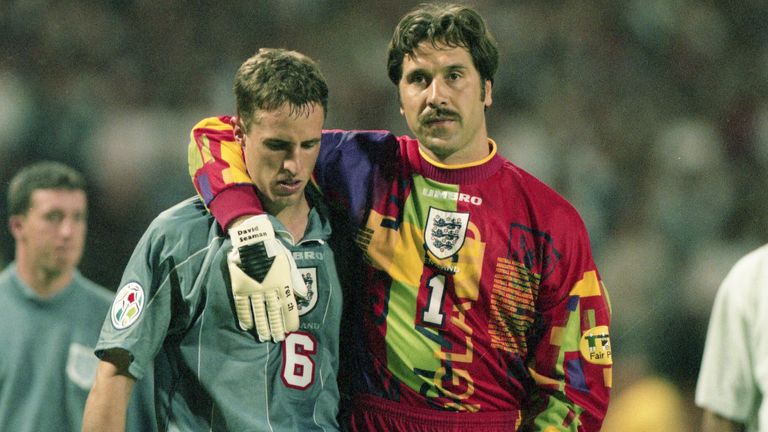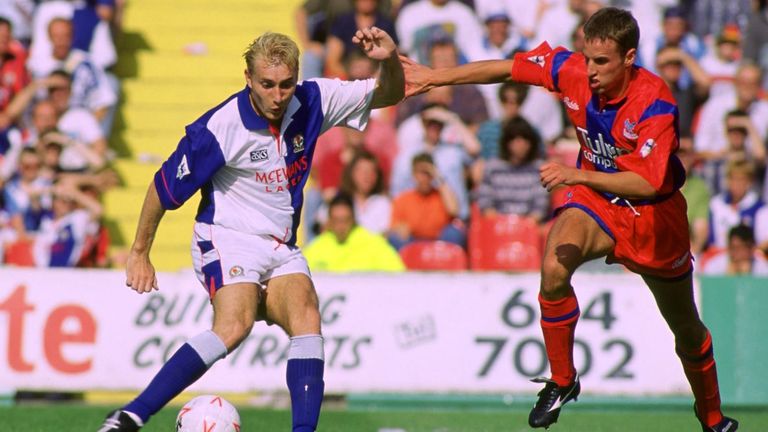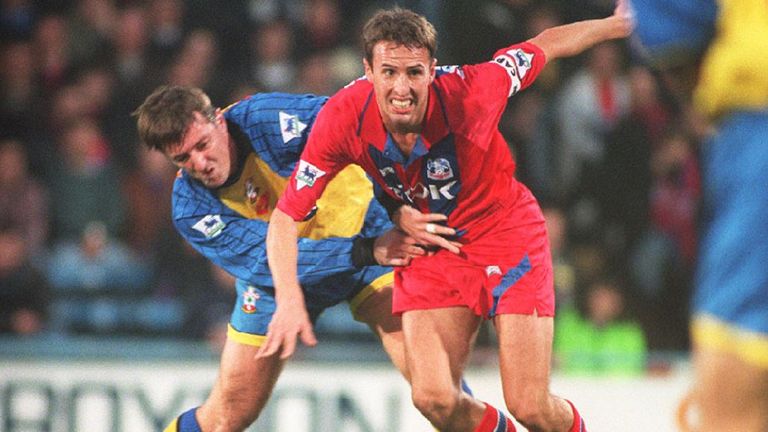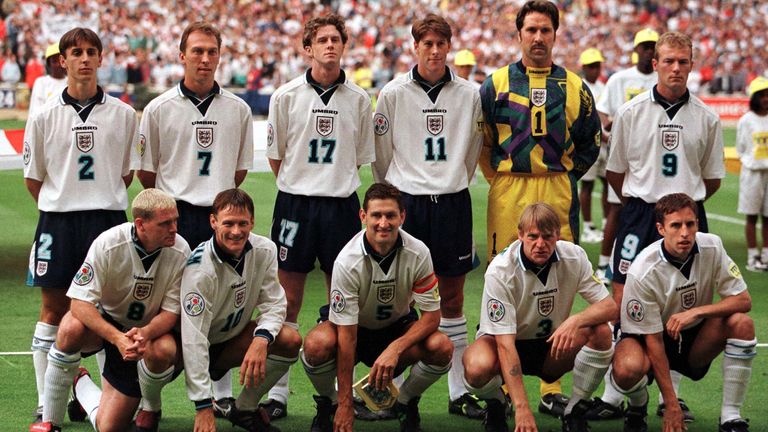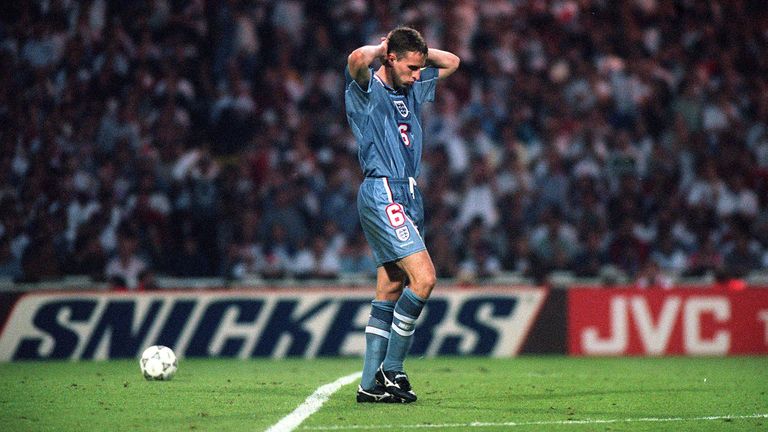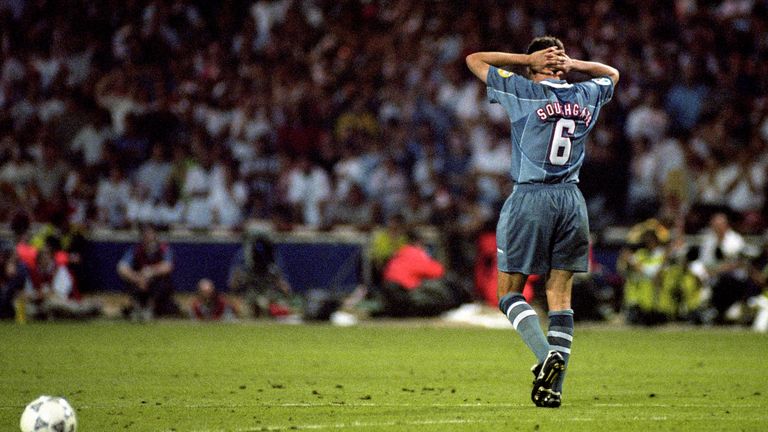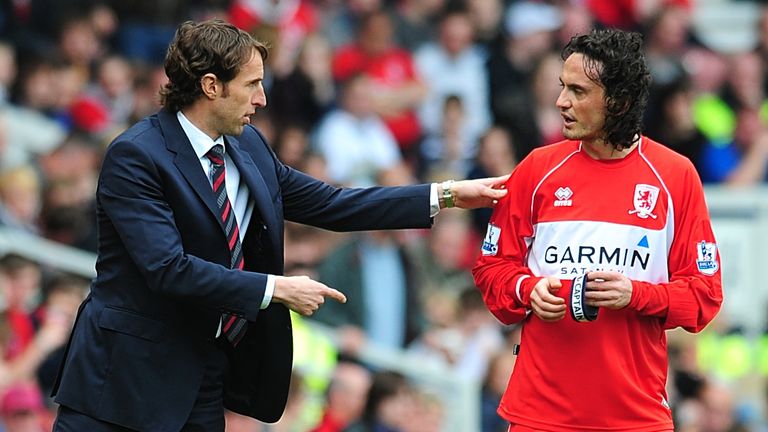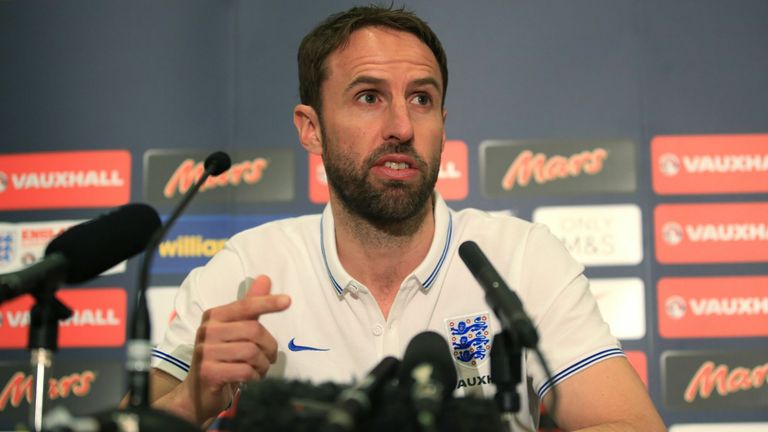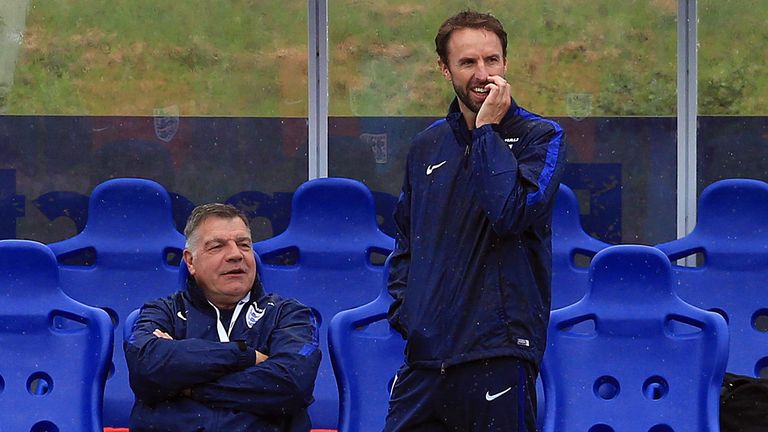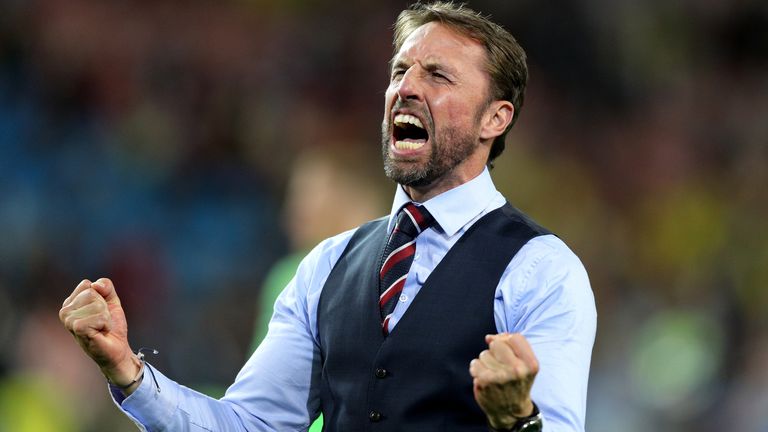Gareth Southgate: From Euro 96 penalty despair to leading England to verge of history
Gareth Southgate’s England team will attempt to make history on Wednesday in a tournament that has been a story of redemption for the Three Lions’ boss.
The Euro 2020 semi-final clash against Denmark at Wembley will see the national team try to reach their first major final since the famous 1966 World Cup win.
The match is almost 25 years to the day since the nation was plunged into despair when England lost on penalties to Germany in the semi-finals of Euro 96.
And in a turn of events that Hollywood writers could script, it is Southgate – the player who missed the crucial spot kick a quarter of a century ago – who is in charge of England’s bid to end 55 years of hurt for their long-suffering fans.
So what do we know about the manager, nicknamed Nord by his former teammates, who has helped recapture the nation’s affection for the England team after years of disappointment?
Born in Watford on 3 September 1970, Southgate – a boyhood Manchester United fan – could have taken a very different path to football.
As a young boy growing up in Crawley, Sussex, he was a county champion at triple jump, one of the best 200m sprinters in his district, played basketball and rugby and excelled academically, according to his former teachers.
But Southgate suffered a major setback aged 14 when he was diagnosed with Osgood Schlatter’s disease, a condition which involves inflammation of the lower leg bone near the knee joint.
It ruled the versatile youngster out of all sports for months, which his father Clive said “tore him apart”.
Southgate overcame the difficulties caused by his condition to begin his fledgling football career at Crystal Palace, joining the south London club as a schoolboy.
It was there that youth team coach Alan Smith reportedly told a 16-year-old Southgate: “You have to f****** toughen up. Otherwise, no f****** chance,” and suggested he might be better off giving up football to become a travel agent.
The tough talk appeared to work as Southgate made his debut for Palace in October 1990, before he was made club captain aged just 22 when Smith became manager.
Bobby Bowry, who broke into the Palace team shortly after Southgate, says the club’s young players faced the daunting prospect of playing alongside big characters such as Ian Wright and Mark Bright.
“It was either sink or swim in that environment,” Bowry tells Sky News.
“The standards were so high in training that if you didn’t perform, you’d get a kick up the backside.”
Southgate – who could play in defence or midfield – was nicknamed Nord at Palace because of his precise way of speaking, which was compared to that of Denis Norden, the late presenter of It’ll Be Alright On The Night.
“He was a very well spoken, well-educated person,” Bowry says of Southgate.
“But in a 50/50 tackle, he would smash you. It’s just that he wasn’t your archetypal kid from Palace who’s a street kid.
“You don’t go and have a career like he’s had in football if you haven’t got that toughness and desire.
“If you saw him you’d think he’s always got his head in a book but he’s totally different.
“On a night out, he was great fun.”
After leading Palace to the First Division title in 1993-94, Southgate left the following season following their relegation from the Premier League after more than 150 appearances for the club.
He joined Aston Villa for £2.5m in 1995, the same year he made his debut for England – the first of his 57 international caps.
And it was playing for England during the summer of 1996 that Southgate became a household name.
Under manager Terry Venables, he played in every game for the national team at Euro 96, as Baddiel and Skinner’s Three Lions (Football’s Coming Home) rang out at Wembley for the first time.
On the evening of 26 June 1996, England played old rivals Germany in the semi-finals of the competition, and after the teams couldn’t be separated after extra time, the tie had to settled by a dreaded penalty shootout.
Bowry, who was in the crowd at Wembley, believed his former Palace teammate was going to score when he stepped up to take the spot-kick.
“He’s such a good striker of the ball with both feet, I was actually confident he was going score,” he tells Sky News.
“One year we’d played Man United in the FA Cup semi-final so we’d practised penalties that week and he was knocking them in for fun.
“But doing it in a training session and in front of 70,000 people is a totally different thing.
“When he came up, I think I was more worried than him.
“I think I closed my eyes.”
With the shoot-out tied at 5-5 and going into sudden death, Southgate’s tame penalty was saved, knocking England out of Euro 96 after Germany’s Andreas Moller confidently converted his spot-kick.
Southgate’s mother Barbara reportedly asked her son after the penalty miss: “Why didn’t you blast it, dear?
Years later, Southgate admitted his role in England’s Euro 96 exit was the toughest moment in his professional life and he still carried regret to this day.
“You’re in probably the biggest game the team have had for 30 years at that time, the country was on a tidal wave of emotion and good feeling, and then you walk away from the stadium feeling you’re the person who is ultimately responsible for that finishing,” Southgate said in 2020.
“I never felt anger, I just felt regret, remorse, responsibility.
“To a small degree that still lives with me, to have failed under pressure under that huge spotlight is hard professionally to take.”
Southgate credited a talk with his England teammate Stuart Pearce, who missed a penalty in the 1990 World Cup semi-final, for being “invaluable” in helping him deal with the situation.
“I remember going back to the hotel and sitting having dinner with Stuart Pearce, who’d lived through what I was going to live through,” Southgate said.
“He was able to immediately give me some information about what the next few months might look like and the things I might experience. Looking back that was invaluable really.”
Southgate managed to make light of his Euro 96 blunder later that year by appearing in a Pizza Hut advert where he sat in a restaurant with a paper bag over his head, alongside Pearce and Chris Waddle, who also missed a penalty at Italia 90.
Back in his club career, Southgate won the League Cup with Villa in 1996 and played in the FA Cup final in 2000, as his side lost to Chelsea.
He was also picked in the England squad for Euro 2000 and the 2002 World Cup in Japan and South Korea.
Southgate moved to Middlesbrough in 2001, captaining the side as they won the League Cup in 2004 and reached the UEFA Cup final in 2006, when they were beaten 4-0 by Sevilla in his final appearance as a player.
That summer Southgate stepped into management aged 35 when he took over at Middlesbrough, replacing Steve McClaren who had become England manager.
Former England under-20s captain Josh Walker, who played for Southgate at Middlesbrough as a teenager, says his old boss had “so much time for everyone… whether you were one of the players or you were the tea lady”.
He even took time to listen to Walker when the player admits he overstepped the mark by complaining that he was not playing regularly aged 17.
“Sometimes he would tell me the reasons why – other times he’d be quite firm and say: ‘Josh, you’re 17 years old, think about how far you’ve come. There are not many kids in the Premier League playing week in week out at 17,” Walker tells Sky News.
“Even though he was firm, he was honest with you.”
After two mid-table finishes in the Premier League, Southgate’s Middlesbrough team were relegated in 2009 and he was sacked in October of that year.
After four years out of football, Southgate returned to management as he took charge of the England under-21 team in August 2013.
The team qualified for the 2015 European Championship but were knocked out after coming bottom of their group.
After the senior England team suffered a humiliating defeat to Iceland at Euro 2016, manager Roy Hodgson was replaced by Sam Allardyce – but an unexpected turn of events would see Southgate soon take charge.
Allardyce was forced to resign after just one game in charge following a newspaper investigation which claimed he offered advice on how to “get around” rules on player transfers.
It meant Southgate took temporary charge of England, then in the early stages of their qualifying campaign for the 2018 World Cup, before he was made permanent manager in November 2016.
Shortly after Southgate had taken over as England manager, Bowry bumped into his former Palace teammate for the first time in 15 years at an under-21 tournament in Poland.
“He gave me a big cuddle… he called me Bobster, my nickname. It was lovely,” Bowry tells Sky News.
“It shows the measure of him. He hadn’t changed as a person, I think that’s a fantastic trait to have.
“Even though he has the best job in English football, he’s the still same person.
“That humbleness, I think that’s why the players resonate with him.”
With supporters’ expectations low going into the 2018 World Cup in Russia, after years of disappointment in successive tournaments, Southgate recaptured the nation’s affection for the England team as they reached the semi-final – including winning their first ever World Cup penalty shootout against Colombia in the last-16.
And Southgate became something of an unexpected fashion icon as his trademark waistcoat was copied by fans across the country, with Marks & Spencer reporting a 35% increase in sales of the clothing item.
Southgate’s England followed up their World Cup run by coming third in the inaugural UEFA Nations League in 2019 before qualifying for Euro 2020.
After topping their group in the tournament, England beat Germany 2-0 in the last 16 and thrashed Ukraine 4-0 in the quarter-finals.
With a semi-final clash against Denmark on Wednesday, Southgate is hoping to lead England to their first major final in 55 years on Sunday, where Italy or Spain will await.
His former teammate Bowry says it was clear from his days as a young footballer that Southgate would be a successful manager.
“The biggest thing that struck me was Gareth was he was the ultimate professional,” he says.
“His standards were just knock out.
“He was always going to be a manager.”
Source: Read Full Article
